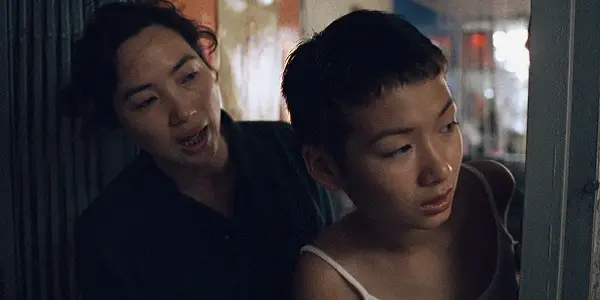MADE IN HONG KONG: Youth In Revolt And Resignation

Lee Jutton has directed short films starring a killer toaster,…
A portrait of disaffected, disillusioned young people who can barely imagine their future beyond the next morning, Made in Hong Kong was the first independent film to be released in Hong Kong following the handover in 1997. It is all too fitting that a new 4K restoration of the film is being released by Metrograph Pictures during yet another tumultuous period in Hong Kong history more than two decades later. Thanks to writer-director Fruit Chan’s stylishly nihilistic storytelling and a charismatic lead performance from Sam Lee, Made in Hong Kong still packs a powerful punch to the gut, one that will leave you reeling long after the final frame flickers out.
Little Man, What Now?
Autumn Moon (Lee) is a high school dropout with few prospects. His father has abandoned the family for a mistress, and soon his mother takes off as well, leaving Autumn Moon up to his own exceedingly questionable devices. He ends up working as a debt collector for one of the local triads, known as Fat Chan, and adopting a mentally disabled young man named Sylvester (Wenders Li) as a sidekick of sorts, though Autumn Moon notes that when you’re the “big brother” of a guy like Sylvester, you have little chance of being taken seriously by the other gangsters.

Despite this hit to his already rather pathetic reputation, Autumn Moon cares for Sylvester in his own misguided yet loyal way, chasing down and threatening the school kids who think that picking on Sylvester makes them seem tougher than they actually are. It’s clear that, beneath his harsh exterior, Autumn Moon is hiding a decent-sized heart, but whether or not he can maintain it as he gets increasingly tangled up in the violent world of the triads remains to be seen. Meanwhile, a kindly social worker named Ms. Lee checks in on Autumn Moon and his cohorts and tries to keep them from getting into too much trouble, but despite her best efforts, she rarely succeeds.
One day while collecting a debt, Autumn Moon meets and falls in love with the daughter of one of the debtors, a spunky young woman named Ping (Neiky Yim Hui-Chi). Ping’s prospects for the future are even bleaker than Autumn Moon’s; her kidneys are failing, and unless she can get a transplant soon, she will likely die. Together, these misfits explore the underbelly of their city and contemplate the recent suicide of one of their peers, Susan (Amy Tam Ka-Chuen). Susan’s spirit haunts Autumn Moon’s nights, while Ping’s increasingly desperate condition haunts his days. Eventually, Autumn Moon goes so far as to take on an assassination contract from Fat Chan just so he can earn money for Ping’s medical bills. The danger inherent in such an act doesn’t mean much to him; after all, without Ping, what else does Autumn Moon have to live for, anyway?
Only the Good Die Young
Shot on leftover 35 mm filmstock amidst the grimy high-rises of the Hong Kong projects, with a largely non-professional cast and a crew of merely five, what Made in Hong Kong lacks in glossy filmmaking it makes up for in gritty style. The active camerawork makes the film look and feel reminiscent of a street documentary, while the performances from the main cast seesaw between hopeless ennui and youthful exuberance in a way that practically shrieks with authenticity.

As our protagonist and narrator, the low-rent tough guy Autumn Moon, Sam Lee is the livewire that runs through Made in Hong Kong, vibrating at an extreme frequency that seems liable to destroy him and everyone else around him at any given moment. With his spiky hair and too-small shirts (almost always showing at least an inch of taut midriff), he even looks like a wire as he struts through the streets of Hong Kong, throbbing with electricity. Autumn Moon is not the most threatening of wannabe gangsters; his overly c*cksure appearance is likely to elicit more giggles than anything else. But watching him try his best to rise up out of the grime and be a better person – especially for Ping’s sake – is truly remarkable. Watching the rest of the world continue to beat him down, however, to the point that he loses the motivation to keep trying, is downright heartbreaking.
Indeed, apart from some flashes of awkward hilarity in the first act of the film, Made in Hong Kong is startlingly bleak; rather than leave our young protagonist with hope for the future, he’s left with very little of anything at all. Yet that is part of what makes this extremely low-budget film impactful beyond its limited means. In Autumn Moon’s struggle to escape a life barely eked out in the looming shadows of public housing, one can see so many other alienated young people who were born on the lowest rung of society and never even afforded the opportunity to claw their way up to a better future. Autumn Moon tries his best, but there’s always someone hovering above him, pushing down on his spiky head and putting him back in his predestined place. It’s easy to see why young people like him and Susan are running out of energy to keep living.

In one scene that I particularly loved, Autumn Moon, Sylvester, and Ping visit a sprawling cemetery built into the side of a rather steep hill; it feels as though the numerous tombstones are on the verge of tumbling over the edge into nothingness. Crawling about haphazardly on top of family mausoleums and memorials, they scream Susan’s name together, hoping to summon her spirit and ask her why she felt that she had to die. Despite the morbidity of the setting, which foreshadows the tragedy that is to come, the scene is one that bursts with hope; Susan may be dead, but the three of them are, for that moment at least, still alive, and still together. While this moment of bliss ends up being all too brief, it is one that Autumn Moon returns to time and time again as his life begins to rapidly spiral downward. And in such dark and uncertain times as our current year, it’s worth being reminded of the comfort that can be found in such fleeting moments of joy.
Conclusion
It might be Made in Hong Kong, and capture the specific upheaval going on in that region at that time as millions of people found themselves wondering what would happen next, but Fruit Chan’s bleak tale of alienated youth should appeal to anyone who has ever felt the future slipping away from them.
What do you think? How familiar are you with Hong Kong cinema? Share your thoughts in the comments below.
Made in Hong Kong opens November 27, 2020 in a nationwide digital engagement available exclusively through Metrograph Ticketed Screenings.
Watch Made in Hong Kong
Does content like this matter to you?
Become a Member and support film journalism. Unlock access to all of Film Inquiry`s great articles. Join a community of like-minded readers who are passionate about cinema - get access to our private members Network, give back to independent filmmakers, and more.
Lee Jutton has directed short films starring a killer toaster, a killer Christmas tree, and a not-killer leopard. Her writing has appeared in publications such as Film School Rejects, Bitch: A Feminist Response to Pop Culture, Bitch Flicks, TV Fanatic, and Just Press Play. When not watching, making, or writing about films, she can usually be found on Twitter obsessing over soccer, BTS, and her cat.













